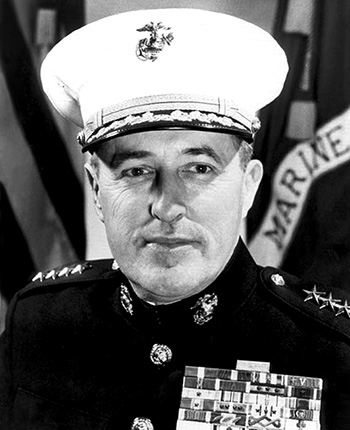
|
Raymond G. Davis |
 |
|||
| Rank, Service | ||||
General O-10, U.S. Marine Corps |
||||
| Veteran of: | ||||
|
||||
| Tribute: | ||||
Ray Davis was born on January 13, 1915, in Fitzgerald, Georgia. He was commissioned a 2d Lt of Infantry in the U.S. Army Reserve through the Army ROTC program at Georgia Tech on June 25, 1938, and he resigned his commission in the Army to accept a commission as a 2d Lt in the U.S. Marine Corps on June 27, 1938. Lt Davis attended the Basic School at Marine Barracks Philadelphia, Pennsylvania, from July 1938 to May 1939, followed by service with the Marine Detachment aboard the heavy cruiser USS Portland (CA-33) from June 1939 to July 1940. He then attended the Base Defense Course at MCS Quantico, Virginia, and then the Fire Control Instrument Course at the U.S. Army Ordnance School in Aberdeen, Maryland, from August 1940 to February 1941. His next assignment was as a Battery Officer, Reconnaissance Officer, Plans and Training Officer, Executive Officer, and finally as Commander of the 1st Antiaircraft Artillery Machine Gun Battery with the 1st Marine Division at Guantanamo Bay, Cuba; Parris Island, South Carolina; Quantico; and finally at Marine Barracks New River, North Carolina from March 1941 to January 1943, during which time he participated in the Battle of Guadalcanal. Maj Davis served as Executive Officer and then Commander of the 1st Special Weapons Battalion of the 1st Marine Division in the Pacific from February 1943 to April 1944, followed by service as Commanding Officer of 1st Battalion, 1st Marine Regiment of the 1st Marine Division from April to November 1944. He was wounded during the Battle of Peleliu in September 1944, and returned to the United States in November. LtCol Davis then served as Tactical Inspector, Chief of the Instruction Section, and later as Chief of the Infantry Section at the Marine Corps Schools at Quantico from January 1945 to May 1947. He served as Assistant Chief of Staff for Operations and Training and then for Logistics with the 1st Provisional Marine Brigade on Guam from August 1947 to May 1949, and then as Inspector-Instructor for the 9th Infantry Battalion of the Marine Corps Reserve in Chicago, Illinois, from June 1949 to August 1950. His next assignment was as Commander of 1st Battalion of the 7th Marine Regiment in Korea from August to December 1950, and then as Executive Officer of the 7th Marine Regiment from December 1950 until he returned to the United States in June 1951. Col Davis served with Headquarters U.S. Marine Corps at the Pentagon from June 1951 to June 1954, and then completed the Special Weapons Employment Course at Norfolk, Virginia, in September 1954. After attending the Senior Course at MCS Quantico, he served as Assistant Director and then Director of the Senior School from June 1955 to October 1957. Col Davis again served with Headquarters U.S. Marine Corps from October 1957 to August 1959, followed by National War College from August 1959 to June 1960. His next assignment was as Chief of the Analysis Branch with U.S. European Command in Paris, France, from June 1960 to June 1963, and then as Assistant Commander of the 3rd Marine Division on Okinawa from October 1963 to November 1964. Gen Davis served as Assistant Director of Personnel and then as Assistant Chief of Staff, G-1, with Headquarters Marine Corps in the Pentagon from December 1964 to March 1968, and then as Deputy Commanding General of the Provisional Corps in South Vietnam from March to May 1968. He served as Commanding General of the 3rd Marine Division in South Vietnam from May 1968 to April 1969, followed by service as Deputy for Education and Director of the Education Center at Marine Corps Development and Education Command at Quantico from May 1969 to July 1970. Gen Davis served as Commanding General of Marine Corps Development and Education Command from July 1970 to March 1971. His final assignment was as Assistant Commandant of the Marine Corps from March 12, 1971, until his retirement from the Marine Corps on April 1, 1972. Ray Davis died on September 3, 2003, and was buried at Forest Lawn Memorial Gardens in College Park, Georgia. |
||||
|
||||

